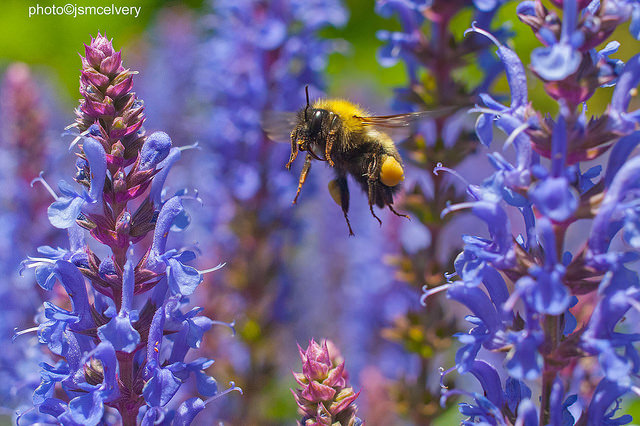
A bumblebee cruising around at New England Botanic Garden at Tower Hill. Photo by Jonathan McElvery
By Robert Burgess
A recent study suggests bumblebees do better where you might least expect it.
According to a study published this month in Proceedings of the Royal Society B, the bumblebees being researched did better in urban settings than they did in rural farmland or suburban locations.
How could this be? The results seem counter-intuitive. Researchers suggested to the New York Times that the bumble bees in question had a hard time thriving in agricultural areas, perhaps because large swaths of land are covered with one crop at a time that blooms for a short period. It might also be that chemicals used on those fields are harmful to bumble bee populations.
The manicured landscapes of suburban neighborhoods may not be much better – too many lawns, pesticides, and ornamental plants that don’t provide the nourishment healthy hives need.
Scientists found that city spaces offered the bees a better chance.
“We’re not saying from this that urban areas are the solution to bumblebee declines or that urban areas are the ideal habitat,” said Ash Samuelson, a graduate student at Royal Holloway University of London in Britain and lead author of the study. “But given the choice of two unnatural situations, they’re actually able to exploit that city environment, which is very different to what they evolved in.”
What can you do to help bumblebees – and all bees, really? New England Botanic Garden at Tower Hill CEO Grace Elton talks about creating a bloom succession on your property, so there is food for the bees all the time, and dropping a partially submerged stone in your birdbath so bees have a perch to drink from. Getting as close to organic in your landscaping practices as possible helps too, no matter if you live in the country, suburbs, or city.
Even better, bring a friend to New England Botanic Garden at Tower Hill next month for August Aflutter. You’ll be introducing someone to the plight of these important creatures and inspiring them to support nonprofit organizations like New England Botanic Garden at Tower Hill that educate the public on how to care for garden spaces, which benefit bees, people and more.
Robert Burgess is the public relations manager at New England Botanic Garden at Tower Hill.
